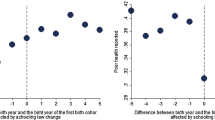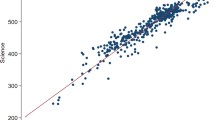Abstract
This paper explores the role of quality of schooling as a source of inequality of opportunity in health. Substantiating earlier literature that links differences in education to health disparities, the paper uses variation in quality of schooling to test for inequality of opportunity in health. Analysis of the 1958 NCDS cohort exploits the variation in type and quality of schools generated by the comprehensive schooling reforms in England and Wales. The analysis provides evidence of a statistically significant and economically sizable association between some dimensions of quality of education and a range of health and health-related outcomes. For some outcomes the association persists, over and above the effects of measured ability, social development, academic qualifications and adult socioeconomic status and lifestyle.
Similar content being viewed by others
References
Alderman H, Hoddinott J, Kinsey B (2006) Long term consequences of early childhood malnutrition. Oxford Econ Pap 58: 450–474
Arendt JN (2005) Does education cause better health? A panel data analysis using school reforms for identification. Econ Educ 24: 149–160
Arendt JN (2008) In sickness and in health—Till education do us part: education effects on hospitalization. Econ Educ Rev 27: 161–172
Balia S, Jones AM (2011) Catching the habit: a study of inequality of opportunity in smoking-related mortality. J R Stat Soc Ser A 174: 175–194
Carneiro P, Crawford C, Goodman A (2007) The impact of cognitive and non-cognitive skills on later outcomes. CEE Discussion Papers, London
Case A, Ferting A, Paxon C (2005) The lasting impact of childhood health and circumstance. J Health Econ 24: 365–389
Contoyannis P, Dooley M (2009) The role of child health and economic status in educational, health and labour market outcomes in young adulthood. Can J Econ 43: 323–346
Cowell F, Victoria-Feser M (2006) Distributional dominance with trimmed data. J Bus Econ Stat 24: 291–300
Currais L, Rivera B, Rungo P (2010) Effects of the complementarity of child nutrition and education on persistent deprivation. Econ Lett 106: 67–69
Cutler D, Lleras-Muney A (2008) Education and health: evaluating theories and evidence. In: Schoeni R, House J, Kaplan G, Pollack H (eds) Making Americans healthier: social and economic policy as health policy. Russell Sage Foundation, New York
Cutler D, Lleras-Muney A (2010) Understanding differences in health behaviors by education. J Health Econ 29: 1–28
Davidson R, Duclos J (2000) Statistical inference for stochastic dominance and for the measurement of poverty and inequality. Econometrica 68: 1435–1464
Dearden L, Ferri J, Meghir C (2002) The effect of school quality on educational attainment and wages. Rev Econ Stat 84: 1–20
Dela Croix D, Doepke M (2003) Inequality and growth: why differential fertility matters. Am Econ Rev 93: 1090–1113
Feinstein L (2000) The relative economic importance of academic, psychological, and behavioural attributes developed in childhood, CEP Discussion Paper, London
Foresi S, Peracchi F (1995) The conditional distribution of excess returns: an empirical analysis. J Am Stat Assoc 90: 451–466
Galindo-Rueda F, Vignoles A (2005) The declining relative importance of ability in predicting educational attainment. J Hum Resour 40: 335–353
Heckman J, Rubinstein Y (2001) The importance of noncognitive skills: lessons from the GED testing program. Am Econ Rev 91: 45–49
Heckman J, Stixurd J, Urzua S (2006) The effects of cognitive and noncognitive abilities on labour market outcomes and social behavior. J Labor Econ 24: 411–482
Jones A, Rice N, Rosa Dias P (2010) Long-term effects of cognitive skills, social adjustment and schooling on health and lifestyle: evidence from a reform of selective schooling. Health Economics and Data Group (HEDG), University of York Working Paper 2010;10/11
Kuhn P, Weinberger C (2005) Leadership skills and wages. J Labor Econ 23: 395–436
Lefranc A, Pistolesi N, Trannoy A (2009) Equality of opportunity and luck: definitions and testable conditions, with an application to income in France. J Public Econ 93: 1189–1207
Lindeboom M, Llena-Nozal A, Van der Klaauw B (2009) Parental education and child health: evidence from a schooling reform. J Health Econ 28: 109–131
Lleras-Muney A (2005) The relationship between education and adult mortality in the United States. Rev Econ Stud 72: 189–221
Mayer-Foulkes D (2001) The long-term impact of health on economic growth in Mexico, 1950–1995. J Int Dev 13: 123–126
Mazumder B (2008) Does education improve health? A re-examination of the evidence from compulsory schooling laws. Econ Persp (Federal Reserve Bank of Chicago Economic Perspectives) 1: 2–16
Miguel E, Kremer M (2004) Worms: identifying impacts on education and health in the presence of treatment externalities. Econometrica 72: 159–217
Oreopoulos P (2006) Estimating average and local average treatment effects of education when compulsory schooling laws really matter. Am Econ Rev 96: 152–175
Pischke S, Manning A (2006) Comprehensive versus selective schooling in England and Wales: what do we know? IZA DP No. 2072
Power C, Peckham C (1987) Childhood morbidity and adult ill-health, National Child Development Study User Support Working Paper No. 37
Roemer JE (2002) Equality of opportunity: a progress report. Soc Choice Welf 19: 455–471
Rosa Dias P (2009) Inequality of opportunity in health: evidence from a UK cohort study. Health Econ 18: 1057–1074
Silles M (2009) The causal effect of education on health: evidence from the United Kingdom. Econ Educ Rev 28: 122–128
Trannoy A, Tubeuf S, Jusot F, Devaux M (2010) Inequality of opportunities in health in France: a first pass. Health Econ 19: 921–938
Van Doorslaer E, Jones A (2003) Inequalities in self-reported health: validation of a new approach to measurement. J Health Econ 22: 61–87
Van Kippersluis H, O’Donnell O, Van Doorslaer E (2009) Long run returns to education: does schooling lead to an extended old age? Timbergen Institute Discussion Paper 037/3, Amsterdam
Wagstaff A, van Doorslaer E, Watanabe N (2003) On decomposing the causes of health sector inequalities with an application to malnutrition inequalities in Vietnam. J Econom 112: 207–223
World Food Programme: (2006) World Hunger Series 2006: hunger and learning. FAO—United Nations, Rome
Author information
Authors and Affiliations
Corresponding author
Rights and permissions
About this article
Cite this article
Jones, A.M., Rice, N. & Rosa Dias, P. Quality of schooling and inequality of opportunity in health. Empir Econ 42, 369–394 (2012). https://doi.org/10.1007/s00181-011-0471-2
Received:
Accepted:
Published:
Issue Date:
DOI: https://doi.org/10.1007/s00181-011-0471-2




